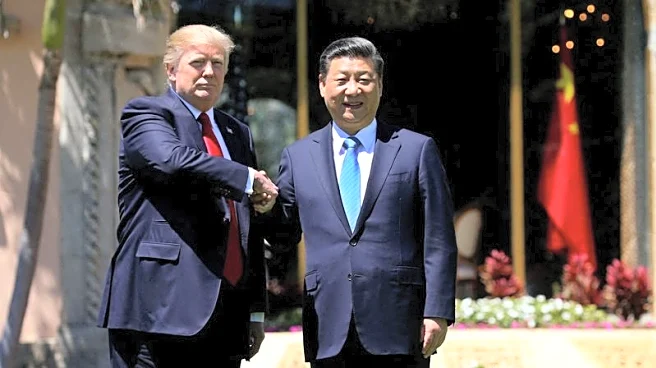BEIJING (Reuters) -U.S. President Donald Trump faces one of the toughest challenges of his second term when he meets Chinese President Xi Jinping in South Korea on Thursday, where the world's two largest economies will seek to avert an escalation of their trade war.
Washington and Beijing have raised tariffs on each other's exports and threatened to halt trade involving critical minerals and technologies.
Neither side expects a breakthrough that would restore terms of trade that existed before Trump's
second-term inauguration in January. Talks between the two sides to prepare for the meeting focused on managing disagreements and modest improvements, before a visit by Trump to China that is expected to happen early next year.
RARE EARTHS
China has vastly expanded its rare earths export controls, including five new elements, placed extra scrutiny on semiconductor users, and added rules requiring compliance by foreign producers who use Chinese materials.
China's earlier rare earths export curbs have roiled global producers reliant on Chinese supplies as it produces over 90% of the world's processed rare earths and rare earth magnets used in many modern technologies from smartphones to fighter jets.
The U.S. has sought for China to abolish the restrictions and Treasury Secretary Scott Bessent said after weekend talks in Malaysia that China will delay its expanded licensing regime by a year and re-examine it. China did not discuss specific steps.
FENTANYL
Trump has imposed 20% tariffs on Chinese imports over what he described as Beijing's failure to curb the flow of precursor chemicals used in the production of fentanyl, which has caused nearly 450,000 U.S. overdose deaths. Those tariffs have remained in effect despite a fragile trade truce reached by both sides in subsequent talks.
Beijing has defended its drug control record and accused Washington of using fentanyl to "blackmail" China. Both sides have been in a stalemate over the issue for months and the issue of fentanyl was raised during the Kuala Lumpur talks.
SHIPPING
The U.S. has imposed port fees on ships built, owned or operated by Chinese entities in a move Trump said was aimed at helping pay for a revival of U.S. shipbuilding and expected to cost the top 10 carriers $3.2 billion next year.
In response, China introduced port fees on U.S.-owned, operated, built, or flagged vessels and sanctioned five U.S.-linked subsidiaries of a South Korean shipbuilder. Measures from both sides are already disrupting flows and pushing up rates.
AGRICULTURE
Bessent told NBC on Sunday that China will make "substantial" purchases of U.S. soybeans under the proposed trade deal framework, after Beijing effectively boycotted U.S. soybean imports this year due to the trade war.
As a result, U.S. soybean farmers have been cut off from their largest export market and are currently awaiting a bailout from the Trump administration. Analysts say Beijing is aware this is a pain point for Trump, as any damage to his rural support base could threaten his standing in the mid-term elections in 2026.
China bought more than half of U.S.-grown soybeans in 2023 and 2024. U.S. exports to the country peaked in 2022 at a value of $17.92 billion.
TIKTOK
Bessent said on Sunday that both sides had "reached a final deal on TikTok" and "all the details are ironed out". The U.S. and China previously announced they had reached a "framework deal" to divest a majority stake in the Chinese-owned app to American investors - the only major outcome of last month’s trade talks in Madrid. However, the deal was not implemented.
This time, Bessent said both leaders are expected to "consummate" the deal when they meet, but it is not known whether more recent changes were made to the original framework.
TARIFFS
Both sides discussed further extending the suspension period for U.S. reciprocal tariffs on China, currently capped at 30% on Chinese imports, which was due to expire November 10.
Trump had threatened to levy an additional 100% tariff on Chinese goods from November 1 in retaliation for China’s expanded rare earth export controls, but Bessent said it was "effectively off the table" after this weekend's talks.
MEASURES READIED BY U.S.
The U.S. is developing new measures targeting China, including software-powered exports and extensive sectoral tariffs for semiconductors, pharmaceuticals and other key industries.
Washington on Friday launched a new tariff investigation into China's "apparent failure" to comply with the "Phase One" U.S.-China trade deal signed during Trump's first term in 2020.
(Reporting by Antoni Slodkowski and Laurie Chen; Editing by Michael Perry)

















